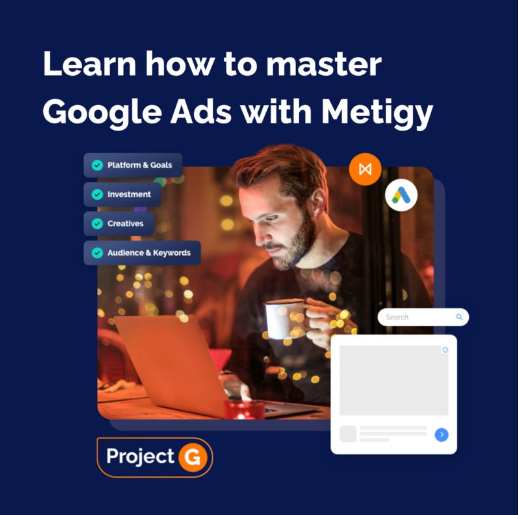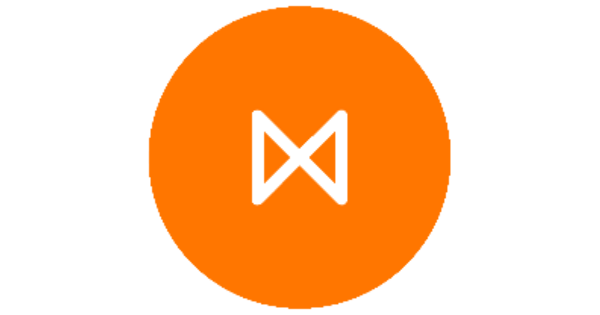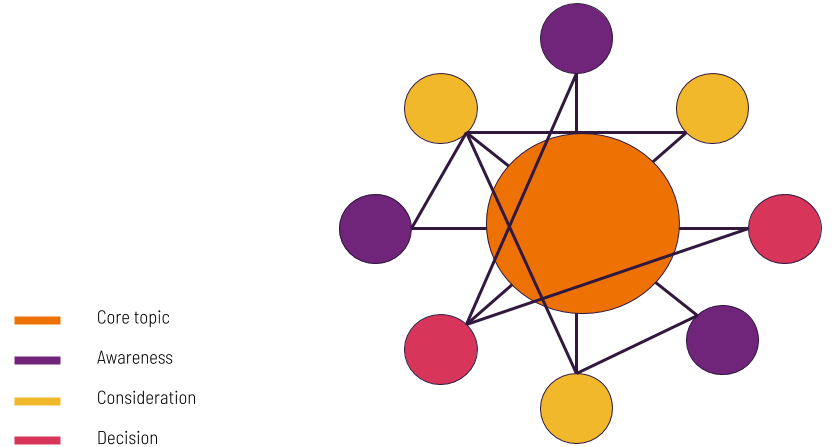Metigy’s Google Ads solution is live.
We are excited to have built an easy way for SME’s to create and manage Google Ads with just a few clicks in a simple interface.
In the following webinar, we wanted to answer the question of why customers should use Google Ads and why they will work for you. And in particular, how Metigy is using our AI Recommendation technology to address the issue that a lot of businesses have with Google Ads. And that is the perceived complexity of creating and running an ad campaign.
The webinar features Greg, one of the co-founders of Metigy and Aleksandra Wocial from Google Australia, who works with companies like Metigy that help provide the benefits of Google Ads to local businesses.
Check out the webinar below to learn the benefits of Google Ads, if they will work for your business and how you can easily start your first campaign using Metigy:
Table of Contents
ToggleOther Google Ads Resources
- Meet Simone and Margaret, owners of DOGUE | Using Google Ads to grow their business
- 10 tips to write effective Google Ads with examples
- 3 Google Ads tips to improve your performance
- Google Ads quick and easy getting started guide using Metigy
- Getting started with Google Search Ad creation
Start growing your business with Metigy and Google Ads today
We’ve created a simple way for you to run a successful Google Ads campaign, backed by our AI recommendation technology. You can start using Google Ads inside your Metigy account and drive customers to your site.
Try Metigy today and break down the process of creating Google Ads every step of the way with a simple setup and our AI recommendations help you capitalise on missed opportunities through keyword and audience suggestions.

Signup and unlock Google Ads today using our AI Recommendations!
Transcript
Greg:
Hey everyone, thanks for joining us today and taking the time out of your day to find out about Google advertising. This is a new module we’ve just added to Metigy in our quest to help you do your marketing better and simpler. I’m really glad you’ve taken the time to come and join us and learn about this vast
topic. Now, my name is Greg and I’m one of the co-founders here at Metigy. Today, we’re going to be talking about Google Ads and how Metigy has addressed the number one challenge facing SMEs that want to start using them, and that’s the complexity of creating and running a successful Google Ads
campaign.
Anyone that’s tried them can see how powerful Google Ads are and how much power is in there, but it’s been built for the power user who has the time to learn and understand the depth of options. Obviously that brings a lot of complexity to it. What we’ve worked on at Metigy is to address these challenges
using our AI recommendation technology to really simplify that flow, and we’ve wrapped it up in a beautiful interface which makes it really simple for you to master them. I’m also joined by Alex who is a strategic partner manager at Google Australia.
Aleks:
Hi, everyone. Thanks so much for having me. My name is Alex. I’m working at the Google Australia office. I’ve been at Google for almost six years. In my current role, I work with local companies like Metigy that help provide the advantages and the benefits of Google Ads into local businesses in
Australia and New Zealand.
Greg:
We’ve been lucky enough to have the support of Google while we work on this module, which has been excellent, which is why I’ve Alex to come and give you some more background on this topic because we know Google Ads can be really quite complex the first few times you do it. Now, by the end of this
presentation, you will know about the power of using Metigy and Google Ads to grow your business and generate more leads and sales for your business and also how to get started with your first Google Ads campaign within Metigy. This is a project that we’ve worked very closely with Google on and we believe
that it’s the next evolution of where marketing is going and using tools like Metigy, going for the multichannel approach to promote your business in multiple places.
Greg:
I’ve asked Alex to come and educate you on the benefits of Google Ads as it can be really complicated. If you’ve not used it before, we’ve really worked to try and simplify the process of creating those ads because there is a whole depth to Google that you just cannot touch unless you are an expert. What
we’ve done is combining that with our best in class AI decision support technology to try and give you those recommendations without having to know all of that knowledge. What I’m going to do is hand over to Alex who’s going to talk through some of the benefits of running Google Ad campaigns.
Alex:
That’s right. Thanks so much, Greg. I’ll tell you hopefully more about Google Ads and what are the benefits that you as a business can have when using Google Ads campaigns. Well, I’ll start with this interesting statistic. At Google, we very often talk to many businesses in Australia to understand their pain points, challenges, and some of the opportunities they have. It was very interesting and surprising for me to see the results from the recent study that showed that as many as 68% of small businesses wish there was an easy to use tool to help them advertise their products and services. At Google, we
continuously tried to make our products easier to navigate and to run smoothly.
Alex:
But to your earlier point, we hear very often that sometimes things are just a little bit too complex, and you don’t necessarily know how to move step-by-step to create successful ads, and you might require prior knowledge to set up successful campaigns. That is why at Google we believe that it’s best for
businesses if they surround themselves by trusted partners who can show them how to navigate through that complex digital ecosystem. That is also why I’m here today with Metigy who just launched a Google Ad solution on their Metigy platform. By helping small and medium businesses embark on their
digital advertising journey, we can directly influence their revenue growth and performance.
Alex:
Connected Small Businesses study shows that small and medium businesses that use advanced digital tools such as Google Advertising or data analysis experience nearly four times higher revenue growth than less digitally savvy businesses. What’s more, they also have as much as six times higher
employment growth and are almost three times as likely to create more jobs. Those are really wonderful insights that show that digitally savvy SMBs are significant drivers for economic growth, job creation, and new innovation. The stuff that you can see right now in front of your eyes I think are very insightful and something that makes us proud to work at Google. We showed that the impact that we as Google Australia have on local businesses.
Alex:
Based on the latest Google Economic Impact report, we can see that Google Advertising tools have so far generated 32 billion in business benefit for more than one million businesses across Australia. Those are benefits to you as a business that you can get from using our tools.
Greg:
Huge. Again, you can know that we’re committed to helping SMBs as well, so that’s why this is a great partnership we’ve got in place here because we really want to help you do all these things amazingly.
Alex:
That’s right and that’s very inspirational because we can see the actual impact that our tools can have on the local economy. On top of that, Google Search Grants and Advertising tools helps connect more than 1.1 million businesses and nonprofits in Australia. That’s also pretty significant. Let me tell you more
what is Google Ads and how you can use it as a business. In very simple words, Google Ads is a Google online advertising program that you can use to connect with people that use our products such as Google Search, YouTube, or they are browsing on the internet. What are some of the benefits that you
as in business can get from advertising on Google? I think we chatted about it earlier. That’s one of the main questions we always get.
Alex: I’m very happy to show you what are the benefits you can get from Google campaigns. Google is where people search for what to do, where to go, and what to buy. I’m sure that you all have done a Google search in the past, so you’re familiar with what I’m talking about. Google Ads lets you create effective
ads and service them to people who are searching online for information and the products or services you offer as a business. our Google Ad appears on the Google Search results page at the very moment someone is looking for your products and services like yours. Businesses like you advertise on Google to
grow interest in their offerings, be present at the moment of intent to buy, and re-engage with existing customers. Well, what do I mean when I say intent to buy?
Alex:
Well, think about a situation that your house just got flooded. What do you do? Chances are high that you will go to Google and you will look for plumbers that can help you with your flooded house. That’s what millions of people in Australia and globally do, which shows that Google is a powerful place that
can help you connect as a business with your potential customers, for people that are looking for you regardless if they are on their mobile phone or if they are on their laptop. That is why I put it as number one benefit from using Google Ads, which is the ability to reach the right customers in the right time
when they are looking for your business. You might ask me, okay, well, how does Google know how to reach the right person for my business?
Alex:
Google prides itself in having the strongest intense signals in the marketplace. Our solutions are informed by seven products, which you can see on this screen from left to right, from Google Search to Google Gmail, and those are products that are used by over one billion people globally every month.
Google understands the context and therefore can learn from the users that move between those different products. This enables to us to connect you with the right audience. We know their life stage, their life patterns, their purchasing behavior and their intent to buy, which is really beneficial to you as a
business. What are some other benefits from using Google Ads? Well, after you acquired your initial customers, it’s also very important to continue engaging with them and create loyalty.
Alex:
With Google Ads, you can reach your customers with special offers, tailored messaging to grow their lifetime value for you and for them as a customer. Last but not least, also very important, Google Ads helps you drive meaningful results so you can focus on your own business. It’s important for me to
highlight here that with Google Ads, you only pay if someone clicks on your ads. What that means is that Google passes qualified leads to you as a business and you only pay if someone showed an interest in what you’re offering. It’s also good to mention, I think this is something that you will love, that when you
want to advertise on Google, you don’t have to have a set budget. There’s no minimum spending budget requirement.
Alex:
Your Google Ads can work with any budget, no matter if it’s small or big, and you can make it work for you and your business. You can also track the tangible results on Google. You can decide to optimize your campaign to drive more phone calls for your business, let’s say if you’re a local plumber, florist, if you want to drive more sales, so if you’re selling products online, or if you want to generate store visits, if you are let’s say a local company, local hairdresser that cares about people coming into your business.
Greg:
I think that’s probably what you just said on that last slide is where people get really quite overwhelmed with the power of Google because there’s so many things you just said. What we’ve really tried to work on is helping you with what to do, when to do it, and then how to optimize it once it’s running so you
don’t have to think about it as much. That’s where the AI on our side comes in to help actually running those campaigns and creating those campaigns especially.
Alex:
That’s right. Fully agree. Well, to quickly summarize for what we were talking about, three main benefits of Google Ads that I believe are very important for you to know is number one, the ability to reach new clients, number two, engage with those clients and grow loyalty, and last but not least, track results and
make sure that your Google campaigns are delivering the ROI that you are looking for.
Greg:
Then we’re going to take that one step further and make sure it fits into the rest of what you’re doing because we’re obviously an omnichannel platform, so it fits in perfectly with that strategy.
Alex:
That’s right.
Greg:
All right. Thank you for that, Alex.
Alex:
Thank you.
Greg:
Now, we’re going to go and do a demonstration of the platform now to go through and just see what we’ve done and give you some of the insights into how it’s working. Here we are in the Ads Management homepage and you can see I’m showing you the Metigy account where we’ve got some
ads running at the moment. We can see we’ve got some active ones here. We’ve got a couple that are in state that are probably being reviewed at the moment or have been rejected for whatever reason. We can see how much we’ve been investing per day, how many clicks, how many impressions we’ve got.
We’ve got a couple that are performing rather well I think. We’ve got one there with the 714 clicks and 79,857 impressions. That shows you how much you can get in front of your audience on Google.
Let’s start by creating a new ad and we’ve made this really simple. Now, I will say this a Google Ads platform, but you can see we’re planning to add other platforms here. Now, we’re going to start by clicking on start with Google and on the right here we will be giving you recommendations and tips on
what you should be doing at this point. We’ll click start. If you haven’t got an ads account, this will ask you to connect up at this point. Here we can see our goals. We’ve got increasing web visits, promoting brand awareness, which are two of the things that Alex was talking about, and then conversion and
sales will be coming very, very soon. If not, they’re here already by the time you watch this video.
I’m going to choose website visits for the time being and then I’m just going to choose Google Search Ads because I think that’s probably the one people are most familiar with at this point. But if you want to do Google display ads, it’s a really simple process, very, very similar. We’ve tried to make it as familiar
as possible to you, and it fits with the rest of the Metigy ecosystem in terms of the usability and UX.
Alex:
Actually the best is still to have both because they may cater for different goals. You might have start with the search one and then add a display one after that.
Greg:
That’s a very good tip. Then moving forward onto the creative, and now this is where things get interesting with Google. Now, for this particular keyword, we’ve got three headlines, two descriptions and a URL. As you can see in the preview on the right, this is what this ad’s going to look like. I’m just
going to put in a title or I will put in Metigy as the first title. We’ll do marketing tools and we’ll do Google Ads as a the third word.
Alex:
I love it that you can see it’s straight after how the ad will look like. I think it’s something that everyone that creates a Google Ad for the first time, they want to know, okay, like how things will look. This is great.
Greg:
I think one thing that’s really important and powerful to mention here as well is you see this plus that’s come up next to the titles, we can actually add another headline in. This is one of the three powerful things Google does is if we put a second one in here saying Google search ads, for example, what Google will actually do is start to run what are called variance of your ad to actually try and find which combinations work best. You’ll actually get even better value out of Google by running these variance to say they’ll try serving it. If they see one is running better than the other, that will get served more.
Alex:
That’s right. That’s the benefit of the machine learning though, we use within Google Ads, all in an effort to make sure that we choose the titles and headlines that are performing best for you.
Greg:
We’re going to be adding in our own AI recommendations as well to enhance that further before you actually even create the ads. You start to see the power of the combination of the two tools working here. I’ll just put in a small description here. I’m going to be…
Alex:
Very creative.
Greg: I know. I know. It’s one of those like I could sit here and write a long sentence, but I’m not going to because recording this live. Then we’ll put our URL in. We’ll do https://metigy.com as our target. We can see that’s all built up on the right there perfectly. We can see the two variance there, how it’s going to look in different channels.
Alex:
I just wanted to say that the final URL is where you would like your user to land after clicking the ad.
Greg:
Yeah. For example, if we wanted you to go and see the Google Ads page on Metigy, you’d go to metigy.com/products/googleads. As we move down the page here, we then get to our keywords. This is again somewhere where we’re going to be really enhancing what we offer you. But a couple of tips here,
reading that, you can type a keyword or a website address to start this, and that’s really, really important. If I put in metigy.com, we’ll actually get back some keywords that are related to our website. This is what Google understands about the Metigy website, which is again very powerful when you can
really align your campaign with how Google understands you.
Greg:
That’s something Alex was talking about was you really have to think about how your ad relates to your website and your content and make sure you’re getting the relevant parts. If you use a specific landing page, these keywords would be different.
Alex:
That’s right, yes. You can just pick and choose those that you believe are most relevant, and you can also add your own keywords if you don’t see that particular keyword suggested by Google.
Greg:
Let’s put in digital marketing because that’s a very important word for our industry. We can see as we type it starts to make some suggestions going through. Here we can see the keywords that have come up around that key phrase, why digital marketing, digital marketing, marketing strategy. Those are all
things we want to help you with. Let’s put that in, marketing strategy. Why digital media strategy? That’s very important. As we were saying, a lot of people don’t realize the power of doing that local advertising. I think we need to help people on that because we do see a lot of people coming to our
website as well saying, “Why should I do this?” As we can say, here’s our words that have appeared. That’s great. I think we’re ready to move onto the next step.
This is where we choose what we call the audience. What we’ve tried to do here is combine the things that you tend to think of as a user, as to who your audiences are, where they are, the demographics they fit into and what languages they speak. One difference between the keywords one and the display
ads is you also get interests. The reason for that is that Google needs that to actually align your ad to the websites you’re visiting. It’s based around interests at that point. Let’s type in a location we want to go to. I want to target Sydney, and then we can see first results, Sydney, New South Wales. Perfect. I want
to exclude a region, and this is very important as well.
Greg:
If you’re running a campaign where you want to target a specific geographical area, but you know that perhaps you’re competing with someone who’s in a specific part of that area and you don’t want to try and outbid them because you know they are doing something that might make you add more expensive.
We can exclude that area.
Alex:
Right. Also, if you’re a local business that operates only within Surrey Hills, let’s say, you can really narrow your targeting to make sure you’re reaching all the local customers because that’s what will make your advertising effective and will bring the best results for you.
Greg:
Absolutely. I think it goes back to your flower example earlier.
Alex:
That’s right.
Greg:
Flower shop in Surrey Hills and then we can start to choose what the demographics are. We want to say male, female. You will know your audience and we will be working to give you some recommendations around who you want to target. One thing to remember here is it’s actually good to do testing at this
point. If you think your demographics one, sometimes it’s worth trying a different one just to try that shift. Again, that’s where we want to hold your hand and help you make those decisions going forward. I’m just going to leave that as it is for now and move onto the next step, which is what we call
investment. This is how much you’re going to put into Google to run this campaign. Now, we have it set as a default of $5.
Greg:
Going to cost you $35 a week to run this campaign, and you have a couple of options here. Now, we can say, “I want to run say $10 a day.” That would give you not an unreasonable amount. Now, you can go up to thousands of dollars a day if you’ve got that budget. You can go as little as $1 a day if you want,
but we wouldn’t advise that.
Alex:
Yeah. I think that a lot of people that start creating their first ad, they are very tempted to put $1 or as little as possible. But keeping in mind that our Google campaigns need data to optimize. $1 budget per day might only last you for one keywords, so one click from a person. That’s not enough to optimize
your campaigns and to make sure you’re taking the full advantage of the system.
Greg:
I will say one thing here as well, which is the first couple of days you might see it go over your daily budget. The reason for that is, as Alex said, it’s the machine learning how your ad fits into the massive Google ecosystem. But you’ll find over time it will normalize out and you won’t have… It’ll work out as
your budget per day.
Alex:
Right. I think important to mention in our systems, we look at the monthly budget. Within the monthly budget, you’ll never spend more than what you were planning. But on a certain day, the budget can go up to 20% more. Then obviously if it goes 20% more on Monday, then it might go lower on Tuesday or
Wednesday to obviously balance it out.
Greg:
We can change this as well to say, how much do I want to invest in total? You might want to run a $100 campaign and you can set your end date there, or say, “I’m going to run one for two weeks. $100 two weeks, it’s going to cost me about $10 a day. It’s not unreasonable.” It goes back to what we just said. I
think that’s a good choice. We’ll go with that for this ad. Now, this is important. You can say Google can manage the cost of my click, or you can set it yourself. Google does a really good job of managing your click to get the good value. If you want to try and set the cost yourself, you can. We will say it takes a bit of practice to get that right, and again, we want to help you with that. We’ll advise you over time if we
think you should set a top click.
But on the whole, Google’s machine learning does a fantastic job. They’ve put so much effort into making sure those things are optimized to help you.
Alex:
Right. Well, one thing we need to remember is that for every ad that you create and for every keyword that your client might enter, the ad enters an ad auction. There’s a certain bid for every keywords that let’s say became normal for that particular query. You might need to do a little bit of a research prior to
know what’s that cost per click. Are we talking about $1 or $5? If you don’t necessarily know that, my recommendation will be to go with the automated solution as Google has that information and will optimize your bid and make them most realistic to enter the ad auction.
Greg:
Yeah, that’s a really good advice. Again, we want to help give you some recommendations around your keywords and your bids and things like that to say, “This is typically how your bid performs,” but it’s actually a really good point is around keywords change value over time as well. For example, in
summertime, a tropical holiday might go up in price quite considerably and it suddenly becomes a less appealing keyword to target. We want to help you in controlling those words as well and make sure you get some good value out of your budget. Now, let’s move on to the next step, which is review. We can
see everything we’ve put in here. We’ve got our $10 a day. Here’s our preview. We can click through this and see the variance we’ve put in.
Greg:
We can actually then say, “Yup, here’s our timeframe running for about two weeks. That’s good. Our demographics.” At any point here we can click edit and adjust those, again, if you weren’t happy. Now, let’s give it a name here. Google Ads demo. That’s good. Now, if I hit go live at this point, that will submit
this ad to Google for review, or you can hit save, which will put it back into your ads list as a draft, meaning you can come back and make changes and decide when you want it to go live. You can actually set the go live and get it reviewed from Google and then pause it as well, which is important to know.
You can actually get it reviewed, ready to go, and then pause it so it’s not actually running until you really want to. That’s a good tactic if you think…
If it’s the first time you’ve done this or you want to make sure that you don’t have that delay when your marketing campaign goes live on Monday, for example. Let’s hit save here and then we’ll just come back to the list and we’ll see our Google Ads demo is there now ready. It’s in draft. We can finish that and submit it to Google to go live. Let’s go and have a look at one of these campaigns now that’s been running. Let’s have a look at the ad performance on this one. We can see we’ve had 714 clicks, 80,000 impressions, and it’s cost us $207. That’s not bad. It’s not doing too badly, that campaign. There’s a bit of
room to optimize in there, but $291 per thousand clicks. Not too terribly there. Then we can see over here… This is what I was saying about the Google machine learning as well.
Greg:
You can see there’s a bit more activity at the start, then it dips, and then it starts to sit kind of level as it goes through. That’s the machine learning how your ad performs. That’s a really important thing to know about Google Ads. You can see how we can filter through some of the other metrics in the system,
impressions, investments. We’ll work to surface the things you really need to know as insights for you to understand how your ad’s performing.
Alex:
Right. One thing I do want to mention here is that give your ad campaign time to optimize, right? It’s very crucial. Give it three to four weeks before you assess if Google Ads are performing the way you wanted it. Don’t make changes every day because, as we mentioned, Google algorithms would need
that additional time to know who is the best customer for you to show the ad to.
Greg:
In line with not tinkering with your ad too much, here’s the edit page. What we’ve tried to do again here is simplify down to you can see what things you can edit, so you can adjust your daily bit if you want to. There’s no harm in actually adjusting your bid at any point during the campaign. That’s not so bad. It’s
more if you change the whole thing, your keywords, your targeting starts to screw with how the ad will actually work.
Alex:
That’s your budget, right? Daily investment. Okay.
Greg:
As we go down here, we can see you can actually go down to quite a granular level in Google and you can actually adjust your bid on each word, so you can adjust to increase or decrease it by a percentage. That’s again an important thing to note. If you find that perhaps you’re getting too much of an audience
from somewhere you didn’t really want, you can decrease your bid, for example, for that area to get less of that traffic to get more of your budget into the other bids you do want, for example. That works at a keyword level, a demographic level, location level, lots of levels. We’ve tried to make it as simple as
possible for you to manage that in here.
Again, we’ll be adding AI throughout the platform to actually tell you what we think you should be doing to optimize this on top of what Google is optimizing it.
Alex:
That’s right.
Greg:
I think that wraps up our run through of the platform there. We’ve covered everything we need to show working. I really hope you enjoyed seeing that.
Alex:
Thank you.
Greg:
Really hope you enjoyed that run through of the platform. I’m going to hand over to Alex now who I’ve asked to give just a couple of tips on creating compelling ads because, as we said, there’s a few things and tricks here. As you can see from the platform, we’re going to be adding more and more features to help you with that process to get more out of it. Alex?
Alex:
Yeah. Thank you, Greg, and thanks for showing us the live version of Google Ads in the Metigy platform. We are all very excited about it and happy to tell you a little bit more how to create successful ads. Let’s start with the basics. When you advertise with Google Ads, your ads can appear on different places
across the web, depending how you focus your ads, to whom you chose to show your ads, and then what types of ads you want to create. Our job at Google is to make sure that you are armed with the best tools to help you plan, create target, measure, and optimize your Google campaigns. I’ll provide now a high level of review of search campaigns and display campaigns as those are the two types of campaigns that are currently available on the Metigy platform. But don’t you worry, video advertising on YouTube is also coming up soon, which we’re also very excited about.
Greg:
Oh, we’ve got some big plans there.
Alex:
Great. Well, let’s start with Google search. You are probably most familiar with this type of an ad, if you have ever done a Google search before. Search ads appear next to Google search results when people look for products or services. Building your first search ad can take just a few minutes. The backbone of
every well-performing search campaign are the keywords. Keywords are words or phrases you can choose when you set up your Google Ads campaigns. Those are the terms you think your potential customers are likely to use when searching for your business. Selecting high quality relevant keywords for your advertising campaign can help you reach the customers you want.
When a customer searches for a term that matches your keyword, your ad enters an ad auction to determine if Google Ad system will actually show your ad. The cost of each keyword will be different depending on the quality of your keyword, your competition in the auction, and many other factors. Make sure your keywords and landing page are all closely related to the terms that customers might be searching for.
Greg:
We were actually just talking about this before the webinar. This is a very big area. There’s tips and tricks. I learned something from Alex, I didn’t know about, and we were talking about some strategies. Again, we’re going to be doing a lot of work in our Metigy learning articles and profiles and webinars like
this to actually help you understand those things. But more importantly, we’re going to be building that into the AI in the platform to help you get the absolute most to make sure everything in your system is set up to solve these problems.
Alex:
That’s right. Cool. Thank you. Well, let me give you a few examples so you can actually see how it works within the Google Ads platform. Let’s say you deliver fresh flowers. For a fresh flower shop, you can use keywords such as fresh flower delivery paired with some other keywords. Let’s say fresh delivery flower near me or florist near me. When someone searches on using the phrase fresh flowers, your ad will appear on the Google search results helping you connect with that customer. Remember, again, choosing high quality keywords and relevant keywords for your advertising campaigns can help you
reach the customers you want. Be sure to invest in keywords that are producing results for you.
If after you started your campaign and gave it enough time to optimize, let’s say three to four weeks, you see that your keywords are not bringing you the results you want, you can always change them. You can delete them. You can tweak them. You can add new keywords. Don’t get discouraged if you don’t
know yet much about the keywords. It’s all about testing and trialing and making sure that at the end we choose the keywords that will work for you. For that, we probably will need some time to first learn.
Greg:
I think as well on that one, we’re going to be adding a lot into Metigy to help manage your keywords across different platforms as well, especially fitting into the Google platform. As you say, really needs to hone what those words do. That’s one of the arts of Google Ads, which we really want to help you nail.
Alex:
That’s right. That’s right. When should you use Google search ads? Three main reasons. Number one, if you want to increase sales and drive conversions and inquiries, also if you want to generate leads and if you want to drive potential customers to visit your website.
Greg:
This goes back to what you said about these are people who have intent, which is why they work much better for that kind of traffic.
Alex:
That’s right. Well, generally Google search ads are great for lower funnel solutions, so driving sales and inquiries. I think that’s ultimately what every business cares the most about. Cool. Now that we spent some time talking about Google search, let’s look at the other campaign time type, which many people might not be as familiar with. That’s Google Display Network that offers you a world beyond the search. Google Display help you promote your business when people are browsing online, watching YouTube videos, checking Gmail, or using mobile devices and apps. Google Display Network, or in short GDN, is a collection of websites including Google specific websites such as Google Finance, Google Blogger or YouTube that shows ads.
This network also includes mobile sites and applications. Well, here in front of you you can see an example of Google Display Ads where an advertiser in this case, a retail player, shows an image ad on their website that their potential customer is looking at. Advertisers can choose to display their advertisements in multiple formats for a different range of audience. Targeting ads so that they are shown to the right customers is an essential part of every successful display campaign. It also enables you to tailor your message to ensure it’s relevant and important. When we talk about targeting, it’s important to say that Google Display Network reaches 90% of the internet users worldwide across as many as three million different websites.
Here, once again, what are the main benefits of Google Display Ads? Number one, promote your brand. Number two, generate product awareness, which speak more to the top of the funnel of your advertising goals, but then also within Google Display, you can have different types of targeting that can
help you also increase sales and get more leads. Now, let me tell you a little bit more about a success story of one of our Aussie advertisers we’ve worked with. The owners of Dogue in Bondi Junction in New South Wales started using Google Ads to promote their dog grooming and playtime services. Google Ads has helped them connect with the community of dog lovers around the shop, drive phone calls, and
ultimately getting people into the store. The CEO of Dogue said, “Since we started using Google Ads, we’ve doubled the size of the store”, which is something we always love to hear.
Greg:
Fantastic. We’ve got some more information about this case study and a link to a Google video about this as well in the handout you can download for this particular video we’re doing.
Alex:
That’s right.
Greg:
Excellent. All right. Thank you for that, Alex. I hope you guys found that really useful, which is why I want to go through and just give you some tips and tricks and it gives you some idea of what we’re trying to work on in the platform to actually help you do those things. It’s such a fantastic platform. We see good returns on Google day and out. That’s why we want to get you guys using it in the best way possible. How do you get started with Google Ads on Metigy? Well, first of all, you’re going to need a Google Ads account, which you can generate from just going to Google Ads or when you actually go into Metigy and click connect your account. If you don’t have one, we will link you up to the place to go and do that one.
You’ll need to put your credit card information into Google just because we are managing that on our side at the moment. Then once you’ve done that, you can start creating your first ads in Google. Now, typically like I said in the walkthrough, the approval process is about 24 hours at the moment. I know
Google is working to reduce that one. That’s just to review your creative and make sure it complies with all the standards. Again, we will help you with anything to try and ensure your ad doesn’t ever need to be reviewed or it’ll go straight through. That’s again a useful time-saver for you as a business. Now, we do have an extensive roadmap of features coming. I’m not going to cover them in this video.
If you can’t see it in the platform, it will be coming and you can just ask us when we expect to deliver that feature, which I think is important to say because we are rolling out features every day at the moment and making improvements and adjustments.
Alex:
Yeah. We’re looking forward to seeing them live. This is all very exciting, Greg.
Greg:
I just want to thank Alex for joining me today. It’s been very educational. I hope you guys got a lot out of it.
Alex:
Well, thank you so much for having me. I hope it was a good use of your time and right now you’re ready to start actioning on the things we talked about here and that you have a better understanding of the Google Ads ecosystem and the benefits for you as a business.
Greg:
In particular, how to use that through Metigy. To help you with that, we’ve got a downloadable code, which is Google Ads Webinar, which will give you three months free on the platform if you haven’t already signed up. We’ll see you again very soon with more tips on how to use Metigy to help you with your marketing.
Alex:
Well, thank you for your time. Bye.
Greg:
Bye, guys.









